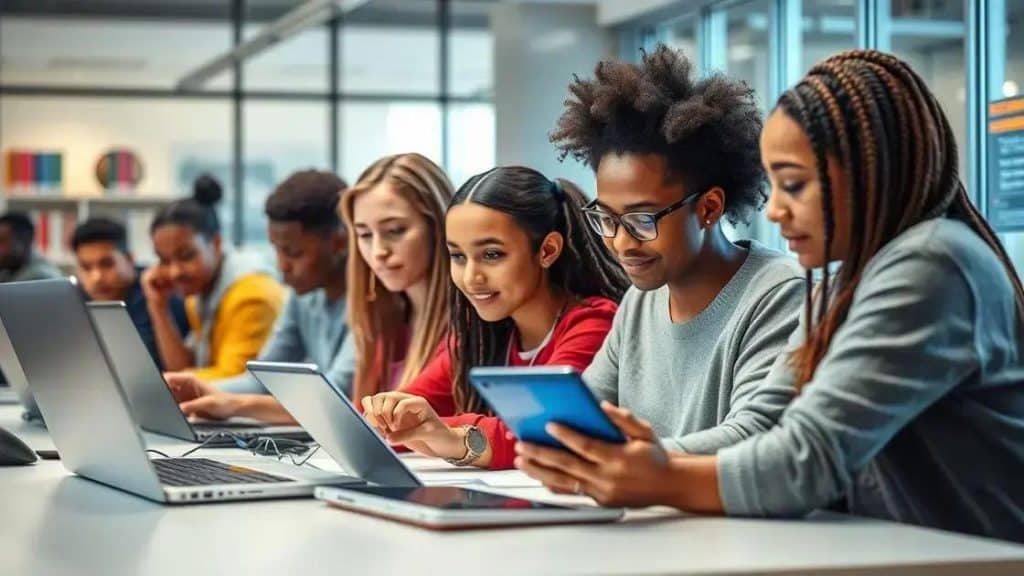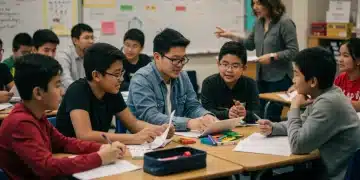Patterns in academic success: a 2025 outlook

Preparing for a changing educational landscape involves embracing technology, adapting teaching methods, and developing skills like critical thinking and collaboration to equip students for future academic success.
Patterns in academic success are shifting as we head toward 2025. Have you noticed how new technologies and societal changes are reshaping education? Let’s dive into what this means for students.
Emerging trends in academic success
As we explore emerging trends in academic success, it’s important to recognize how education is changing rapidly. Trends reflect new ideas and methods that can help students thrive in a modern world.
Technology’s Influence
Technology plays a significant role in shaping academic success. Students now have access to tools that enhance their learning experience. From online resources to interactive labs, technology fosters engagement and understanding.
- Online learning platforms are becoming more popular.
- Virtual classrooms allow for flexible schedules.
- Educational apps help improve study habits.
Additionally, these tools can cater to different learning styles. Some students benefit from visual aids, while others excel through hands-on activities. This variety allows every student to find their best path to success.
Personalized Learning
Another trend is personalized learning. This approach tailors education to individual needs. Teachers can adapt lessons to fit different learners, making education more effective. When students feel understood, they are more likely to succeed.
- Customized lesson plans target weak areas.
- Feedback is provided in real-time.
- Students set personal goals for growth.
Engagement increases when learning aligns with student interests. This trend encourages young minds to participate actively in their education.
The role of social-emotional learning is also gaining attention. As we recognize that feelings impact learning, schools are implementing programs to support mental health. Students learn not only academic skills but also how to manage emotions, leading to better performance.
In summary, understanding these emerging trends allows students, educators, and parents to better prepare for the future. By embracing technology, personalized learning, and social-emotional support, we pave the way for academic success.
The role of technology in education
The role of technology in education is becoming more important every day. Schools and universities are integrating digital tools to enhance learning experiences for students. This integration helps to prepare them for a technology-driven future.
Interactive Learning Tools
One major benefit of technology in education is the use of interactive learning tools. These tools, like educational software and apps, engage students more effectively than traditional methods. For instance, games and simulations can make learning fun and easier to understand.
- Learning management systems help organize class materials.
- Simulations provide real-world experiences in a controlled setting.
- Online quizzes allow for immediate feedback.
By incorporating these tools, teachers can meet diverse learning needs. Students gain a deeper understanding of complex subjects through hands-on experiences.
Online Collaboration
Technology also promotes online collaboration. Students can work together from different locations without being in the same room. This collaboration can happen through discussion forums, group work platforms, or video calls. These methods foster teamwork and improve communication skills.
- Virtual classrooms connect students globally.
- Shared documents make group projects easier.
- Video conferencing helps maintain interaction among peers.
As a result, students become more adaptable and better prepared for future workplaces. Collaboration is a vital skill that many employers value.
Moreover, technology assists in personalizing education. With online resources and data analytics, teachers can track student progress and adjust curricula accordingly. This personalized approach helps identify strengths and weaknesses, allowing teachers to provide targeted support.
In a world where technology continues to advance, embracing these tools in education is essential. Schools must adapt to stay relevant and effective, ensuring that students are equipped with the skills they need to succeed.
How socio-economic factors influence outcomes

Understanding how socio-economic factors influence outcomes in education is crucial for recognizing the barriers many students face. These factors include income level, parental education, and access to resources.
Income Levels
Students from low-income families often struggle to access necessary educational resources. This can include everything from school supplies to tutoring. When basic needs aren’t met, it becomes harder for students to focus on learning.
- Low-income students may attend underfunded schools.
- Access to technology can be limited, affecting learning at home.
- Extracurricular opportunities may be less available.
As a result, these students may fall behind their peers in academic achievement.
Parental Education
The level of education attained by parents significantly affects students’ academic success. Parents who have higher education levels often encourage academic achievement and assist their children with schoolwork. They can also provide a better environment for learning.
- Informed parents may help with homework and projects.
- Encouragement to pursue higher education becomes more common.
- Educational aspirations are generally higher.
In contrast, when parental education is low, children might not receive the same level of support, which can lead to gaps in learning.
Access to Resources
Access to educational resources plays a vital role in a student’s success. Schools in higher-income areas often have more funding, allowing them to offer better facilities and programs.
On the other hand, students in less affluent areas may lack access to libraries, technology, and advanced courses. This lack of access contributes to educational disparities.
Additionally, community support systems can vary significantly based on socio-economic status. Students in wealthier areas often benefit from mentoring programs and extracurricular activities that enhance learning.
Recognizing the impact of these socio-economic factors allows for a stronger focus on addressing inequalities in education. By understanding these challenges, educators, policymakers, and communities can work together to create solutions that support all students.
Key skills for future academic achievement
Focusing on key skills for future academic achievement is essential for preparing students for success in their educational journeys. As the world evolves, certain skills help students adapt and thrive.
Critical Thinking
One of the most valuable skills is critical thinking. This skill encourages students to analyze information and make informed decisions. It helps them evaluate sources, solve problems, and develop innovative solutions.
- Students learn to question assumptions.
- They assess arguments and evidence.
- Creative problem-solving becomes a focus.
By developing critical thinking, students become independent learners who can tackle complex issues effectively.
Communication Skills
Another essential skill is communication. Effective communication helps students express their ideas clearly, whether in writing or speaking. In today’s collaborative environment, the ability to convey information is vital.
- Students practice writing essays and reports.
- Oral presentations help build confidence.
- Group discussions promote active listening.
Strong communication skills pave the way for better teamwork and understanding among peers.
Adaptability
Future academic achievement also relies on adaptability. As changes occur in learning environments and technology, students who can adjust to new situations will prosper. This skill includes being open to feedback and learning from experiences.
When students embrace change, they are better prepared to face challenges and seize new opportunities. Having a flexible mindset leads to resilience and growth.
Furthermore, digital literacy is becoming increasingly important. Familiarity with technology and online tools allows students to research, communicate, and collaborate effectively. These skills contribute to their readiness for the demands of modern workplaces.
By emphasizing these key skills, educators can better prepare students for a bright future. Integrating critical thinking, communication, adaptability, and digital literacy into learning helps students become well-rounded individuals ready for academic success.
Preparing for a changing educational landscape
Preparing for a changing educational landscape requires flexibility and openness to new ideas. As technology advances and learning methods evolve, educators and students must adapt to these changes.
Embracing Technology
One crucial aspect is the embracing of technology in classrooms. Digital tools enhance learning by making it more interactive and engaging. Schools should incorporate software and applications that support various learning styles.
- Online resources provide instant access to information.
- Educational platforms offer personalized learning experiences.
- Virtual classrooms allow for increased collaboration.
By utilizing these tools, teachers can create an engaging environment where students explore subjects at their own pace.
Adapting Teaching Methods
Another important component is adapting teaching methods. Traditional lecturing is shifting towards more collaborative and hands-on approaches. In this new landscape, teachers act as facilitators rather than just sources of knowledge.
Incorporating project-based learning encourages students to work together and solve real-world problems. This method promotes critical thinking and prepares students for future challenges.
Developing Lifelong Learning Skills
Preparing for change also means teaching students the importance of lifelong learning. In a world that continuously evolves, the ability to learn new skills is essential. Encouraging curiosity and adaptability helps students thrive in uncertain environments.
Schools should foster a culture where students feel safe to ask questions and explore topics beyond the curriculum. This approach nurtures inquisitive minds and enhances overall learning.
Furthermore, encouraging collaboration and communication among students prepares them for teamwork in their careers. These skills are crucial in an interconnected world where the ability to work well with others can make a significant difference.
By actively preparing for a changing educational landscape, educators can empower students to succeed in their academic and professional lives. Understanding how to adapt and embrace new methods ensures that learners are equipped for the future.
As we look toward the future of education, it is clear that adapting to changes is vital for success. By embracing technology and shifting teaching methods, we can create engaging learning experiences. Skills like critical thinking, communication, and adaptability will ensure that students are prepared for the challenges ahead. With a focus on lifelong learning, we can empower the next generation to thrive in a constantly evolving world.
FAQ – Frequently Asked Questions about Preparing for a Changing Educational Landscape
How can technology enhance classroom learning?
Technology can make learning more interactive and engaging by providing access to various educational tools and resources.
What skills are most important for future academic success?
Key skills include critical thinking, communication, adaptability, and digital literacy, which help students thrive in a changing world.
Why is lifelong learning essential?
Lifelong learning prepares students to continuously adapt to new challenges and opportunities in their academic and professional lives.
How can educators facilitate collaboration among students?
Educators can use group activities and projects that encourage teamwork, helping students develop valuable interpersonal skills.





